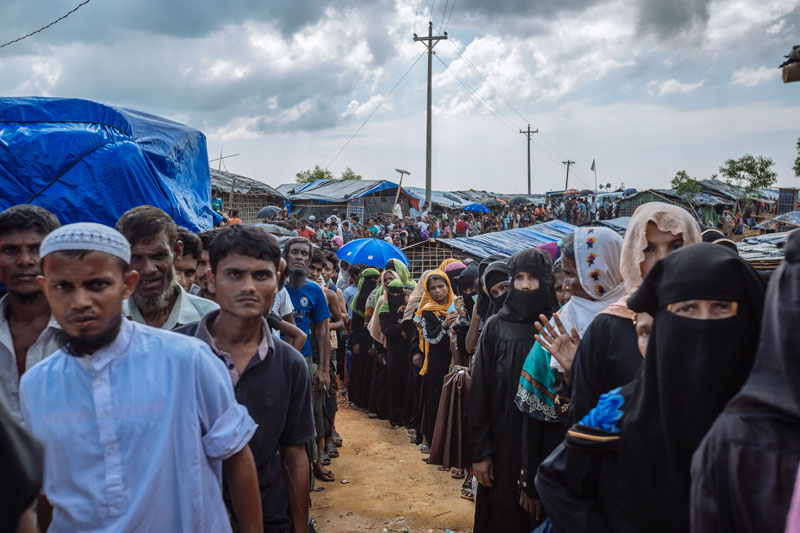-
Who we are
WHO WE AREThe International Organization for Migration (IOM) is part of the United Nations System as the leading inter-governmental organization promoting since 1951 humane and orderly migration for the benefit of all, with 175 member states and a presence in 171 countries.
-
Our Work
Our WorkAs the leading inter-governmental organization promoting since 1951 humane and orderly migration, IOM plays a key role to support the achievement of the 2030 Agenda through different areas of intervention that connect both humanitarian assistance and sustainable development.
What We Do
What We Do
Partnerships
Partnerships
Highlights
Highlights
- Where we work
-
Take Action
Take Action
Work with us
Work with us
Get involved
Get involved
- Data and Research
- 2030 Agenda
Statement from the UN Migration Agency Director General William Lacy Swing on Pledging Conference for the Rohingya Refugee Crisis
 Geneva - Thank you very much Mr. Chairman. Good morning excellencies, distinguished participants, ladies and gentleman.
Geneva - Thank you very much Mr. Chairman. Good morning excellencies, distinguished participants, ladies and gentleman.
Having just returned from Bangladesh this weekend, I have three very distinct impressions that I would like to share with you as urgent for our consideration.
First of all, the sheer speed, size and scope of the Rohingya refugee crisis that has occurred over the last nearly two months has resulted in a shocking humanitarian emergency that is, I believe, unparalleled in this region and in many parts of the world. You have heard the statistics and it is almost trite to repeat them, but we now have approaching 900,000 people being cared for by the Bangladesh Government, people and local communities at great cost to the country, and being done in a very professional way. The situation therefore requires an unparalleled response on the part of all of us.
Second, as a consequence, Bangladesh Prime Minister, her Government, the people, and numerous local host communities, despite their laudable generosity, and UN agencies, ICRC, NGOs and other partners, despite a massive scaling up of our staff and resources, we are now faced with the challenge of enormous proportions that requires an enormous response over the foreseeable future. To be quite frank, everything is a priority. If you had to look at the top priorities, however, it would probably be above all else shelter – building shelter for 900,000 people, 600,000 of whom have arrived in the last two months – protection, including proper registration, food security, basic health services and water and basic sanitation facilities.
Third point, we are grateful to all of you today for this very strong turnout, and I hope that we are here today to commit ourselves to stay the course in support of the incredibly resilient Rohingya refugees. We must in parallel also, however, urge world leaders to engage a political process that will allow these Rohingya refugees to return home voluntarily and to do so in conditions of safety, security, dignity and social cohesion, and we should insist with Myanmar officials that these conditions are met.
Now, we all know that there are no durable humanitarian solutions to political crises and political problems. The Rohingya refugee situation clearly represents a humanitarian situation that currently cries out the loudest for our help but we also note that we are in fierce competition for resources that are very scarce, including resources for those, who are stretched from Africa to South-Asia in armed conflict. So, we need to give our attention specifically today to making sure that the Rohingya refugees are not somehow lost in this arc of suffering across this area of the world. We need to move quickly to ensure sustainable life-saving assistance to the refugee population in Bangladesh, to help the Government, the people and particularly the numerous host communities in Cox's Bazar, whose resources are already under considerable strain. Simultaneously, we must also urge international leaders to support the peaceful resolution of this decade long crisis in Myanmar and insist that the Myanmar authorities create conditions of safety, security and dignity in Rakhine state to one of the world's most persecuted populations.
Now, we have a road map, the Advisory Commission on Rakhine state that was established by the Office of the State Council and the Kofi Anan Foundation. The recommendations have been accepted by all authorities, this is the way forward to peaceful co-existence in Rakhine state, and we need to insist that we start implementing these right away, step by step, starting with the first step, which is to allow humanitarians to resume their work in the northern part of Rakhine state.
So with that, I will stop here and look forward to our time together today.
Thank you very much.